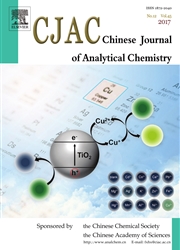

 中文摘要:
中文摘要:
将多层纸芯片技术用于肿瘤微环境酸化研究。将种植有乳腺癌细胞的8层硝酸纤维素薄膜叠放并封装于芯片中,用以模拟3D乳腺癌组织。灌流培养多层纸芯片乳腺癌组织数天后拆分多层纸芯片,以检测各层薄膜上细胞生存、增殖和胞内乳酸含量,解析不同深度下肿瘤细胞微环境酸化程度。实验表明,细胞酸化程度受灌流速度影响,高灌流速度可以增加纸层上细胞密度,酸性代谢产物排出增加。缺氧也是导致微环境酸化的重要因素。随着氧气扩散距离的增加,酸化程度加重,并且肿瘤细胞生存率和增殖率相应降低。
 英文摘要:
英文摘要:
A multilayer paper embedded microfluidic chip was developed for the study of tumor microenvironment acidification.Eight layers of nitrocellulose membrane with cells cultured on were stacked and packaged in a microchip to mimic the 3D breast cancer tissue.The multilayer paper supported breast cancer tissue was perfused for several days and was then split into single layers.Viability,proliferation rate and intracellular lactic acid level of breast cancer cells on different layers were detected to analyze microenvironment acidification.Experimental results demonstrated that acidification of tumor microenvironment was determined by perfusion flow rate: higher flow rate caused higher cell density and consequently increased excretion level of acid metabolite.The insufficient oxygen supply was also a crucial factor to cause microenvironment acidification.The level of intracellular lactic acid increased with diffusion distance of oxygen.It was also found that cell viability and proliferation rate decreased with increasing acidification level.
 同期刊论文项目
同期刊论文项目
 同项目期刊论文
同项目期刊论文
 Three Dimensional Cultures of Liver Cancer Cell on a Poly(dimethyl siloxane)-Paper Hybrid Microfluid
Three Dimensional Cultures of Liver Cancer Cell on a Poly(dimethyl siloxane)-Paper Hybrid Microfluid Study of Microenvironment Acidification by a Microfluidic Chip with Multilayer Paper Supported Breas
Study of Microenvironment Acidification by a Microfluidic Chip with Multilayer Paper Supported Breas 期刊信息
期刊信息
